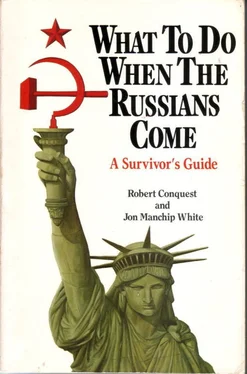Robert Conquest - What to Do When the Russians Come
Здесь есть возможность читать онлайн «Robert Conquest - What to Do When the Russians Come» весь текст электронной книги совершенно бесплатно (целиком полную версию без сокращений). В некоторых случаях можно слушать аудио, скачать через торрент в формате fb2 и присутствует краткое содержание. Город: New York, Год выпуска: 1984, ISBN: 1984, Издательство: Stein and Day Inc., Жанр: Публицистика, на английском языке. Описание произведения, (предисловие) а так же отзывы посетителей доступны на портале библиотеки ЛибКат.
- Название:What to Do When the Russians Come
- Автор:
- Издательство:Stein and Day Inc.
- Жанр:
- Год:1984
- Город:New York
- ISBN:0-8128-2985-9
- Рейтинг книги:3 / 5. Голосов: 1
-
Избранное:Добавить в избранное
- Отзывы:
-
Ваша оценка:
- 60
- 1
- 2
- 3
- 4
- 5
What to Do When the Russians Come: краткое содержание, описание и аннотация
Предлагаем к чтению аннотацию, описание, краткое содержание или предисловие (зависит от того, что написал сам автор книги «What to Do When the Russians Come»). Если вы не нашли необходимую информацию о книге — напишите в комментариях, мы постараемся отыскать её.
What to Do When the Russians Come — читать онлайн бесплатно полную книгу (весь текст) целиком
Ниже представлен текст книги, разбитый по страницам. Система сохранения места последней прочитанной страницы, позволяет с удобством читать онлайн бесплатно книгу «What to Do When the Russians Come», без необходимости каждый раз заново искать на чём Вы остановились. Поставьте закладку, и сможете в любой момент перейти на страницу, на которой закончили чтение.
Интервал:
Закладка:
And remember that these cases occurred in a comparatively relaxed period, in peacetime. You may expect worse, expecially, in the first flush of mass terror. Indeed, we are almost ashamed to have described conditions that appear idyllic compared with those likely to prevail, as they always have done in similar circumstances, when America is subjected to full-scale terror.
Apart from prison and labor camps, there is a third, although more unlikely, possiblity. After ten or fifteen years, assuming things are calmer, the authorities may begin to want some genuine-sounding excuse for the arrest and maltreatment of suspects; in this case a few of you may find yourselves subjected to the latest Soviet refinement: the pseudopsychiatric hospital. In these, as evidence from former inmates and former staff alike make clear, people whose only madness is to dislike communism are declared schizophrenic and injected with chemicals such as haloperidol and sulphazine, without the supplementary drugs necessary to prevent the extremely painful side effects—all under the supervision of the secret police. This would be a very nasty experience but not usually a fatal one, although some who have been released say they have never properly recovered. However, the numbers subjected to this particular horror would be comparatively few.
What lessons might you, as a prospective Soviet convict, derive from what we have told you?
Obviously there is no guaranteed method of survival in a Communist camp, prison or “mental hospital.” The odds are against you. Nor will you be helped by the fact that the widespread dislocation that is bound to attend the first few years of Soviet rule in the United States will inevitably result in food and other shortages in the camps and prisons. They will be desperately overcrowded.
How are you to give yourself the best possible chance?
To begin with, try to be prepared psychologically. From the moment that your Government signs the instrument of surrender, always assume that the worst will happen to you. That way, you will not be betrayed by optimism and will not go into a state of shock or apathy at the moment that you are arrested.
Next, when you are in prison or in the camp, it is vital not to miss any opportunity to eat. This will not be easy since the experience of being thrown into jail will be enough to take away your appetite, and you have seen that even Vladimir Bukovsky could not wolf down, ravenous as he was, those stinking kilka. But you must try to force yourself to eat whatever swill is handed to you, especially in those first few days or weeks, otherwise you are quickly going to lose the physical reserves without which you cannot possibly survive. Be ready to eat anything. In the end, you will discover that you will have no choice, anyway, so the earlier you get used to the idea and swallow down your nauseating slop, the better.
Again, when it comes to the backbreaking labor that you will be assigned, remember that surviving will once again depend on your physical reserves. Some camps will probably be death camps, designed to use up a man’s strength in anywhere between six weeks and six months, and in that case, there will be very little you can do since you will be fed a restricted diet. Even there, however, you will probably want to try to save your energy at all costs. Do everything as slowly as you can possibly get away with—such is the advice of all the survivors of the Soviet camps. Practice extreme slow motion. When you are lumbering, you might adopt the traditional trick of managing to get the same log counted by the guard several times by the expedient of sawing off the check number after each inspection. In most camps it has usually been possible, at least for a time, for separate labor gangs to cooperate in methods to claim a higher productivity than is really achieved. Remember that with every swing of your ax you are chopping an hour off your own life.
In one respect, strangely enough, you may after all be luckier than prisoners in the Soviet Union itself. You may find that in your camp the criminal element, with which every camp will be deliberately seeded, will not have the violence and customary solidarity of the Russian urka or criminal class. So you may discover that, although the American criminals in your camp have been encouraged by the prison authorities to take control and knock you about from the earliest moment of your arrival, it seems at least feasible that a determined and immediate lead by a group of your most vigorous “politicals” may result in the collapse of this form of exploitation. Even within the USSR itself, such a development has occasionally been noted as when a group of tough ex-soldiers, or really stubborn Ukrainian nationalists, have decided to stand up and assert themselves.
Although such a course presents certain dangers, and each situation must be judged on its merits, and there will be ugly scuffles and murders, we would urge you to assume instant readiness for such an opportunity. Otherwise, the acceptance of criminal supremacy will mean robbery gang rape, and a general reign of terror; besides leaving the cooking, control, and distribution of food in the hands of crooks, who will grab the biggest share of your already inadequate rations. Such a lack of boldness at the outset will therefore result in your death from dystrophy a few weeks later.
We seriously urge you, while you still can, to go to your local library and check out whatever books it contains on life in the camps. The works of Solzhenitsyn, and such books as Evgenia Ginzburg’s Into the Whirlwind and General Gorbatov’s Years Off My Life could prove useful guides. Do not read them as literature, or as accounts of alien experiences, but in the light of practical blueprints of a not-improbable future.

3. ESCAPE ABROAD?
THE OPTION TO escape will not be open to many, but if you are in any of the categories doomed to virtually certain death, you are advised to take it if the opportunity should arise.
It is possible, even probable, that some non-Communist countries will remain unoccupied.
The conquest of the United States will of course make the USSR the world’s dominant power, and there will no longer be much question of its ability to take over the world. But there will be good arguments against seeking to achieve this immediately. The Soviets will have strained their military resources to the limit and will be spread thin holding down their vast new empire. There will no longer be any great hurry in dealing with the remnants of “capitalism.” While it is probable that Africa and the Middle East will now be under Soviet control and that the Russians will be involved in a general move forward in South America, they will have several motives for leaving other countries under threat and pressure, without yet moving to take them over.
They may even leave Western Europe, or part of it, uninvaded, as now impotent to harm and politically bypassed to wither on the vine. There would be good economic reasons for this in that the powerful capitalist productivity of these countries will be needed to make up for the old inefficiencies and the new dislocations of the Soviet-occupied world, providing products beyond the skill of the Soviets—just as, today, Finland has been left un-Sovietized, as a valuable trading partner.
It is also wholly possible that China will not yet have been reduced, since that will in any case involve a further enormous military effort, to say nothing of the probability of the Soviet army getting bogged down in a partisan war that would make America’s recent problems in Vietnam small in comparison.
Читать дальшеИнтервал:
Закладка:
Похожие книги на «What to Do When the Russians Come»
Представляем Вашему вниманию похожие книги на «What to Do When the Russians Come» списком для выбора. Мы отобрали схожую по названию и смыслу литературу в надежде предоставить читателям больше вариантов отыскать новые, интересные, ещё непрочитанные произведения.
Обсуждение, отзывы о книге «What to Do When the Russians Come» и просто собственные мнения читателей. Оставьте ваши комментарии, напишите, что Вы думаете о произведении, его смысле или главных героях. Укажите что конкретно понравилось, а что нет, и почему Вы так считаете.












